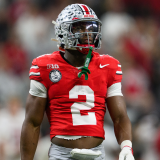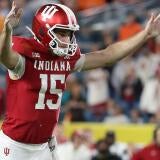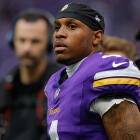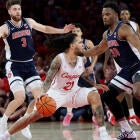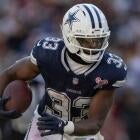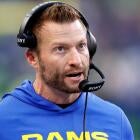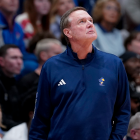2021 NFL Draft smokescreen season has arrived: Will Atlanta or Philadelphia draft a quarterback?
What constitutes a smokescreen and have a few already surfaced in 2021?

Beekeepers use smoke as a way to calm bees to harvest their honey. Smokescreens, on the other hand, have a tendency to antagonize NFL fan bases during the months leading up to the draft. Personnel executives across the league take some creative liberties to expand upon April Fools' Day as smokescreen season has arrived.
When fans think of smokescreens, they might recall Chicago sending a full contingent of personnel evaluators to Clemson for Deshaun Watson's pro day as well as a private dinner with Texas Tech's Patrick Mahomes only to draft North Carolina's Mitchell Trubisky, who had been asked to keep his private dinner with the Bears a secret. Watson later revealed that he had not spoken to the Bears leading up to the draft. General manager Ryan Pace did ultimately trade up from No. 3 overall to No. 2 with the 49ers to select the Tar Heel and the rest is history.
To go back even further, in an article from ESPN.com, it was reported that Denver was interested in a quarterback as part of the 2006 NFL Draft. The team had zeroed in on Vanderbilt quarterback Jay Cutler but did not want to make that interest apparent. Cutler did not work out for Denver and the two parties never met face to face. Broncos head coach Mike Shanahan had entrusted his friend and then-Titans head coach Jeff Fisher to do the scouting for him. Tennessee had narrowed its focus on Texas quarterback Vince Young at No. 3 overall and were not interested in Cutler, so Fisher obliged by filing intel to Shanahan. Denver selected Cutler with pick No. 11 overall.
NFL Media's Daniel Jeremiah noted in 2013 that he believes about 90% of what his friends in the league tell him prior to the NFL combine and only 5% thereafter. The art of deception is prevalent in NFL circles as teams hold their cards close to the vest to ensure they get a player they covet without paying a premium to make it happen.
A year ago, there were some rumors floating around:
The Patriots are comfortable with Jarrett Stidham at quarterback
New England had lost Tom Brady to the Buccaneers in free agency and were faced with the reality of having a new starting quarterback for the first time since Brady took over in 2001. The Patriots were projecting confidence in second-year quarterback Jarrett Stidham but a small sample size highlighted by an interception in mop-up duty had many questioning the validity of that thought. As it turns out, the AFC East franchise was not committed to Stidham. Although the Patriots did not select another quarterback high in the draft, they did sign veteran Cam Newton in free agency. A "quarterback competition" ensued but it was widely understood that it was Newton's job to lose.
The Dolphins are not interested in Tua Tagovailoa
#Tank4Tua had been adopted as Miami's unofficial slogan for the better portion of a year until Joe Burrow's rise to fame and Tagovailoa's injury shook things up. Burrow was unquestionably the No. 1 overall pick to the Bengals but many pondered whether or not another team would need to trade up to secure the rights to either Oregon's Justin Herbert or Tagovailoa. Following a meeting between the team and Tagovailoa, there were reports swirling that the Hawaiian was unimpressive and that the team may no longer be interested; at least at No. 5 overall. Combined with reports regarding the severity of Tagovailoa's hip injury, outsiders started to doubt whether the Alabama product would end up in the first round at all. As history shows, Miami did ultimately take Tagovailoa and did not have to part with any additional draft resources to do so. The smokescreen worked.
The Chargers are going with Tyrod Taylor at quarterback
It became evident that Los Angeles and veteran quarterback Philip Rivers would part ways following the 2019 season. While many were quick to pencil in the Chargers as a team in the draft's quarterback market, the Chargers were peddling the idea that they were comfortable with Tyrod Taylor being the Week 1 starter. As it turns out, both statements could be true. The veteran was the intended starter to open the season but they were still in the market for a quarterback at No. 6 overall. Herbert was selected and his installment as the starter required an improbable incident that could have easily been depicted in a "Game of Thrones" episode.
What smokescreens have been heard and might be heard as the 2021 NFL Draft draws closer?
BYU quarterback Zach Wilson has been fed with a silver spoon
A year ago, it was Herbert receiving the character attacks. The Oregon product was "soft-spoken," "not sociable" and "could never lead an NFL locker room." If the 2020 regular season was any indication, those falsities were unwarranted. En route to Rookie of the Year recognition, Herbert impressed his teammates and assumed the role as leader. The smokescreen may have worked, however. He was the third quarterback taken and Los Angeles did not surrender any assets for the right to select him. There had been reports that the Chargers were comfortable selecting Tagovailoa or Herbert and would happily take whichever fell to the organization.
Wilson has already been the subject of similar questions. A report from WalterFootball.com delivered some scathing remarks from a supposed NFC official: "[Wilson] has character concerns, rich kid who is an entitled brat -- uncle owns Jet Blue -- parents are a pain, not a leader, selfish, and he's a know-it-all." Either the source in question is cowardly attacking a young man that has little room to defend himself or the person is creating a narrative that might sour other teams on the idea of drafting Wilson, which would theoretically benefit the NFC team in question. Neither is a good look.
Eagles, Falcons disinterested in drafting a quarterback early
Quarterback play is a driving force in NFL decision-making. For proof, look no further than the Eagles and Rams willing to part with Carson Wentz and Jared Goff to absorb dead-salary cap space. Production declined and the teams were willing to move on in both instances. As much as Philadelphia and Atlanta want to claim that they are tied to Jalen Hurts and Matt Ryan, respectively, it would be irresponsible to not give it a second thought. The idea of committing to a second-round pick that has not proven he can handle the job long-term or a veteran soon to turn 36 years old is the kind of shortsighted decision-making that gets general managers fired. If either franchise were one or two players away, like Tampa Bay was before adding Brady, then by all means, go all in. The Eagles and Falcons have massive holes on their roster and are far away from contention. Does it make sense to build the roster now only to need a quarterback in two years? Teams can not expect to be in a position to draft a quarterback early year to year so they must strike while the iron is hot. What happens if they pick No. 12 overall next year? It becomes very difficult to move up and get a quarterback of choice. The team may achieve marginal improvement in the short-term but long-term sustainability is being compromised.
Remember when the Giants drafted Penn State running back Saquon Barkley at No. 2 overall with several holes to fill and without a viable quarterback replacement for Eli Manning? They are now in a position to pay Barkley and still do not have an answer at the quarterback position. USC's Sam Darnold, Wyoming's Josh Allen and Louisville's Lamar Jackson were all taken in the first round after Barkley that year. It was one of the more mind-boggling decisions in recent memory. If a talented quarterback is available, teams must pounce, and it is my belief that North Dakota State's Trey Lance, BYU's Zach Wilson and Ohio State's Justin Fields are worth the risk.
More or less, this turned into a rant but it sheds some light on the discussions happening behind closed doors. In the case of Atlanta and Philadelphia, each franchise has introduced a new head coach, which means they will likely have at least two years to develop one of those players. Do not fall into the trap of believing NFL teams with an agenda. Los Angeles' selection of Herbert last year, despite voicing support of Taylor, gives credence to teams always chasing a long-term fit at the quarterback position.
Positional uncertainty for players like Kyle Pitts, Micah Parsons
There has been a lot of discussion about whether to label Florida's Pitts as a tight end or a wide receiver. Parsons has a background that may lead some to label him as a safety, off-ball linebacker or edge-rusher. Notre Dame's Jeremiah Owusu-Koramoah could be a safety or an off-ball linebacker. In the case of Parsons, he is an off-ball linebacker with situational pass- rush ability. Owusu-Koroamoah will essentially serve as a box safety that can play downhill. Some might draw parallels to Isaiah Simmons and the way that he struggled to make an impact last year but that would be misguided. Position-less players are all the rage in the modern-day NFL because they can fill unique roles, but it requires a creative play-caller to use them effectively. When it comes to talents with elite skill sets, do not get hung up on the label but embrace the possibilities. If a coach does not have a concrete plan on how to use such a player, then that team should not make the selection. Once the draft has concluded, said team might need to reevaluate whether or not it has the right person in charge of the offense or defense because play-calling should be adapted to the talent on hand.
Imagine a team that did not understand how to use a Tyreek Hill or Deebo Samuel: is that on the player or the team that drafted him? As the pre-draft process develops, do not be surprised if some of these players start getting dinged by those looking to create a selfish narrative.




